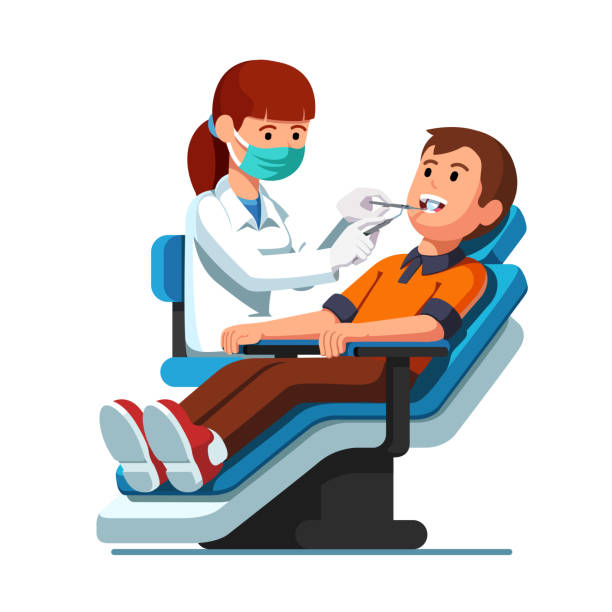Budget-friendly Dental Care Options from Leading Dentists Eugene
Budget-friendly Dental Care Options from Leading Dentists Eugene
Blog Article
A Guide to Common Oral Problems That Require a Dental expert's Treatment
Toothaches, for example, can be symptomatic of extreme concerns such as dental caries, broken teeth, or abscesses, each calling for specific interventions like fillings or origin canals. Impacted knowledge teeth and jaw disorders can introduce substantial pain and complications.
Toothaches
Toothaches are a typical oral problem that can range from moderate discomfort to severe discomfort, usually showing an underlying issue that requires expert focus. This pain can originate from a selection of resources, including dental tooth cavities, cracked or fractured teeth, and oral abscesses. Each of these problems poses significant dangers if left unattended, possibly resulting in more serious problems.
Dental tooth cavities, likewise recognized as decays, are triggered by the accumulation of plaque that wears down tooth enamel, leading to openings or pits in the affected teeth. Abscesses are unpleasant infections at the origin of a tooth or in between a tooth and the gum, normally resulting from serious decay or without treatment tooth cavities.
Efficient therapy of toothaches entails dealing with the origin cause. This might consist of fillings for tooth cavities, crowns for split teeth, or root canals and prescription antibiotics for abscesses. Early treatment by a dental professional can avoid additional deterioration and relieve pain, guaranteeing ideal dental health and wellness.
Gum Tissue Condition
Gum disease, a prevalent yet frequently forgotten dental condition, shows up through inflammation and infection of the gum tissues and sustaining cells. This problem largely occurs in two phases: gingivitis and periodontitis. Gingivitis, the milder type, offers with symptoms such as red, swollen periodontals that might hemorrhage easily during brushing or flossing. If left untreated, gingivitis can advance to periodontitis, a more serious kind defined by the devastation of the supporting bone and connective cells, ultimately resulting in missing teeth.
The main source of periodontal illness is microbial plaque, a sticky, anemic film that regularly develops on teeth. Poor oral health, smoking cigarettes, hereditary predisposition, and specific clinical conditions, such as diabetes, can worsen the risk of establishing periodontal disease. Regular oral exams are essential for early detection and management of this problem.
Therapy for gum disease varies from expert dental cleansing and scaling to advanced procedures like root planing and periodontal surgical procedure, depending upon the seriousness. Preserving great oral hygiene methods, consisting of cleaning two times daily, flossing, and making use of a disinfectant mouth wash, can substantially minimize the threat of gum illness and advertise healthier gum tissues.
Tooth Cavities
Cavities, additionally understood as cavities, are a common oral condition identified by the destruction of tooth enamel as a result of acid-producing bacteria in the mouth. These microorganisms flourish on sugars and starches from food and drinks, generating acids that progressively wear down the enamel, bring about tooth cavity formation.
Early-stage cavities may disappoint signs and symptoms, but as they advance, they can cause toothache, level of sensitivity to cold or warm, visible holes or pits in the teeth, and discoloration. If left neglected, dental caries can penetrate deeper layers of the tooth, possibly resulting in serious discomfort, infection, and also tooth loss.
Stopping cavities involves a combination of excellent dental hygiene techniques and nutritional practices. Routine brushing with fluoride toothpaste, flossing, and regular oral check-ups are essential. Dentists may also advise extra preventive actions, such as fluoride therapies and dental sealers, to secure teeth from degeneration.
Treatment for tooth cavities depends upon their extent. Small dental caries can be addressed with dental fillings, which restore the tooth's structure. If the degeneration has actually gotten to the tooth's pulp, a lot more sophisticated cases might require crowns or also origin canal therapy. Prompt intervention by a dental professional is essential to avoid issues and preserve total oral health.

Impacted Wisdom Teeth
Influenced wisdom teeth are a widespread oral issue that happens when the 3rd molars, typically described as knowledge teeth, fail to completely emerge or line up correctly within the mouth. This condition commonly arises from not enough space in the jaw or an abnormal development angle of the teeth. Impacted wisdom teeth can lead to a range of issues, including infection, damage, and discomfort to nearby teeth.
When wisdom teeth end up being influenced, they are frequently partially emerged or continue to be entirely under the gum line. This partial eruption can produce a path for bacteria to go into the periodontals, leading to infections that materialize as swelling, discomfort, and also high temperature. In addition, influenced wisdom teeth can exert stress on neighboring teeth, potentially creating crowding or changing.
An extensive oral evaluation, normally entailing X-rays, is crucial for identifying impacted knowledge teeth. Regular oral check-ups are suggested to keep this page track of the problem and maintain my review here dental health and wellness.
Jaw Disorders
Jaw disorders, collectively called temporomandibular joint (TMJ) disorders, encompass a series of conditions that influence the jaw joint and surrounding muscle mass. These conditions can show up via symptoms such as pain or tenderness in the jaw, difficulty chewing, a clicking or popping noise when opening or shutting the mouth, and also persistent migraines. TMJ problems can occur from different factors, including joint inflammation, jaw injury, or regular behaviors like teeth grinding or jaw clenching.
Diagnosis of TMJ problems normally involves a detailed analysis by a dental expert, consisting of a physical evaluation of the jaw, dental X-rays, and sometimes advanced imaging strategies like MRI or CT scans to examine the joint's problem. Treatment options differ depending upon the seriousness of the condition. Non-invasive techniques such as physical therapy, dental splints, and medicines intended at reducing swelling and pain are often first-line treatments. In much more extreme cases, surgical interventions may be needed to deal with structural problems within the joint.
Very early treatment by an oral specialist is vital to stop the development of TMJ conditions and to maintain total dental wellness. People experiencing persistent jaw pain or disorder must seek prompt examination and therapy.
Final Thought
Keeping oral health requires prompt professional like attend to usual dental problems. Toothaches often indicate underlying issues such as cavities, broken teeth, or abscesses, calling for timely treatment. Periodontal condition, from gingivitis to periodontitis, demands routine oral check-ups and cleansings to stop development. Impacted wisdom teeth and jaw disorders additionally call for expert attention to relieve pain and prevent additional issues. Regular oral visits are important for diagnosing and dealing with these problems, ensuring general oral health and wellness and health.
Dental cavities, additionally recognized as caries, are created by the accumulation of plaque that deteriorates tooth enamel, leading to openings or pits in the affected teeth. Abscesses are uncomfortable infections at the root of a tooth or between the gum and a tooth, Our site usually resulting from extreme decay or unattended cavities.

Additionally, influenced knowledge teeth can exert pressure on bordering teeth, potentially creating crowding or shifting.
Report this page